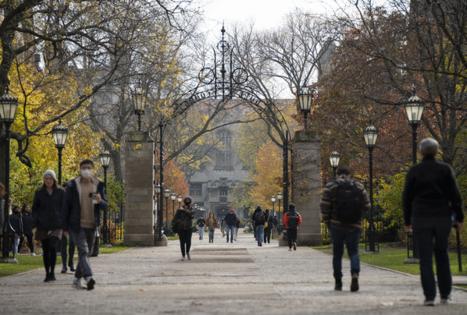Commentary: Committing to the Chicago Principles of free speech is the only way forward for higher education
Published in Op Eds
I’ve been a faculty member at the University of Chicago for 27 years; for 12 of them, I was married to the university’s late president, Robert J. Zimmer. Bob was well known for his endorsement of the “Chicago Principles” addressing academic free speech, which were formulated by a faculty committee he appointed in 2014.
Now, in 2025, at a time when opposing ideological forces threaten to rip higher education apart altogether, it’s clearer than ever we need to observe these principles if we are to maintain our universities as places for inquiry and learning rather than the nurturing of ideologies.
First of all, let’s be clear. Academic free speech and public free speech are not the same, and the Chicago Principles refer to the former, repeating a view of speech on campus with roots deep in the university’s history. “There is not an institution of learning in the country in which freedom of teaching is more absolutely untrammeled than in the University of Chicago,” remarked university President William Rainey Harper in 1902.
Thirty years later, at a time of tension over a communist speaker on campus, President Robert M. Hutchins wrote that students “should have freedom to discuss any problem that presents itself.”
Today, when being either for or against the position of our national government comes with undue risk and when free speech seems to many to be an insoluble problem, these principles — what they allow and what they do not — offer us simple guidelines as the American university faces two crises, both political in nature.
The first crisis is one of free speech — and free thought — under attack. Faculty across the country face constraints on the ability to express a liberal opinion on any controversial matter, especially if related to DEI (diversity, equity and inclusion) or other “woke” topics.
One of my friends from another university worries that despite her U.S. passport (she’s originally Japanese) the ICE men will kidnap her off the street because her work is in gender, disability and health. She doesn’t expect her administration to step in if she’s detained — too many college administrations are primarily worried about losing additional government funding.
My friend is not being paranoid, and that’s pretty terrifying in a country known for tolerance and freedom. Professors and students have been shut down or removed (or have fled the U.S.) for their views. Just think of Rümeysa Öztürk, whose great crime appears to have been co-authoring a pro-Palestinian op-ed for her school newspaper while on a valid F-1 visa.
Never mind the Chicago Principles, ICE’s overreach in her case violates the First Amendment: The government shall not interfere with freedom of expression. Öztürk was not disruptive or violent. She simply published a point of view. Are we willing to let go of this democratic cornerstone that enables public discourse and government accountability? Don’t we want to push back even a little?
The second crisis is arguably one of pushing free speech too far. Some students and faculty on campuses around the country seem to be confusing vandalism and disruption with the function of learning.
Is using a bullhorn an example of academic free speech? If you thereby chill the main function of a university, offering an education, by disrupting classes and students, the Chicago Principles would say it’s not. Nor is taking over a campus quad, vandalizing university property, throwing paint or harassing people you disagree with.
Free speech on campus is enabled by certain limits of time, place and manner that keep it manageable for all. The university “may restrict expression that violates the law, that falsely defames a specific individual, that constitutes a genuine threat or harassment … or that is otherwise directly incompatible with the functioning of the university.” Without such limits a university will have difficulty following its calling.
If the future of the university itself is now at stake, as so many seem to agree, it would be a good time to reinstate our commitment to these principles. University presidents need not have to decide whether or not to call in the police if tent cities spring up on campus and administrative buildings are taken over. It should never get to that stage in the first place.
____
Shadi Bartsch is a professor in humanities at the University of Chicago and former director of the Institute on the Formation of Knowledge.
_____
©2025 Chicago Tribune. Visit at chicagotribune.com. Distributed by Tribune Content Agency, LLC.

























































Comments